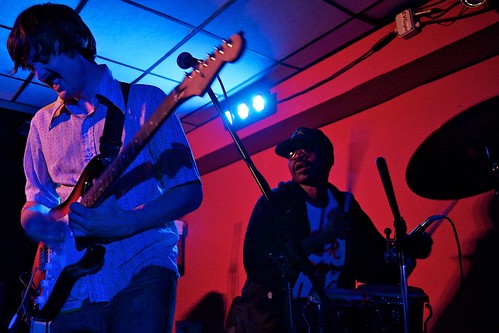Some people love a good lyric. They have them permanently inscribed on their bodies. They whisper them to loved ones in the dark of the night. They stand in for philosophical conceits, political persuasions, and often negotiate the complex space between real feeling and articulation. Me, I usually couldn't care less; it's often just arbitrary condensed syntax that really doesn't mean that much.
Occasionally, lines will snake around your heart, or somewhere a little more cerebral, to take hold. To wit:
“I work hard for everything I own. Everything I own chokes me when I'm asleep.”
“Out of your mind with whorishness, incredibly young, incredibly filthy.”
“Break into the children's hospital screaming 'don't fuck with me! Don't fuck with me!”
“Cut out the infection. Beat up the violator. Gag him, then screw him down.”
“The oil is black and it is thick. Sex is a void filled with plastic.”
“This is the worst vacation ever. I am going to cut open your head with a roofing shingle.”
No, they don't scream 'party' to me either. They're dark, concerned with the grotesque and the violent, attempting a frustrated, futile malediction against a clustering blackness. Against the backdrop of the radio and the overwhelming banality of UK indie's proud underachievers, these are simply words that stand out; be they good or bad.
In the back catalogues of their writers (respectively: Swans, Xiu Xiu, Xiu Xiu, Swans, Swans, Xiu Xiu) these are not necessarily the best, the most novel, or potent examples of their craft. Their words are repulsive because things are awful. This is the world we live in; not that Usher and his ilk Eurodancing their way to the club are not in the same world. It's just that while the world sees Justin Bieber performing 'Baby' inside to a rapt audience, Xiu Xiu's Jamie Stewart sees the barmaid molested in the back-room, the CCTV mysteriously malfunctioning for that day only, the music drowning out the cries. Tell me that it wouldn't happen. Tell me that it hasn't happened already.
In February, Xiu Xiu released their seventh LP, entitled Dear God, I Hate Myself. Fluttering, high drama vocalisms take centre stage against a shifting palette of cold synthesiser, unsympathetic mechanic percussion and abrasive string stabs. The tension is sometimes too much to take: Stewart's vocal tightrope-act balances every track in a state of unremitting drama, a house of cards awaiting the merest zephyr to break the tension. And it never comes. There is no catharsis.
September brought the twelfth LP by Swans, My Father Will Guide Me Up A Rope To The Sky, an audience-funded effort to kick Michael Gira's long-running project back into gear after a decade-long absence. Gira, a singular entity in a world of indiscernibles, would take to the stage in the early '80s and order the back door be bolted and the lights turned off but for a single spotlight. The band would unleash unmitigated chaos, deafening bass thrums and atonal guitars that have more in common with the scrapyard than the stage. As their 1990 live album recalls, Anonymous Bodies In An Empty Room, just before a period of mellowing.
My Father... attempts a clever balancing act between the remorselessness of the visceral and physical Swans and some more overtly melodic, sweeping styles, mostly pulled off to great aplomb. Where Jamie Stewart is a histrionic tenor, Michael Gira is a grave and impassive baritone. If most artists were to announce that a key track on their upcoming record was a seven-minute mini-epic about their daughter, it'd be time to line-up the sick bags. The first four minutes of 'Inside Madeline' batter the listener so thoroughly that the rays of sunshine peeking through at its conclusion are easy to miss.
What is signicant here, then? That these are two albums deep into each band's career whose lyrics reveal their treacly-black auteurs to be fundamentally moralist flaneurs: maybe not Christian by self-identfication, but certainly by de facto action. Those lyrics up there: they're not for kicks or to try and play to the kind of sicko who'd get off on them. Swans and Xiu Xiu have spat naked nihilism in their audience's faces for years now and some of them still don't get it, much like semi-racist Little Englanders don't get Alf Garnett. Now they're spelling it out for us. They inhabit the same moral sphere as Justin Bieber and his exhortations to just 'love you, girl', even though against the banality of the radio, you wouldn't quite notice.








